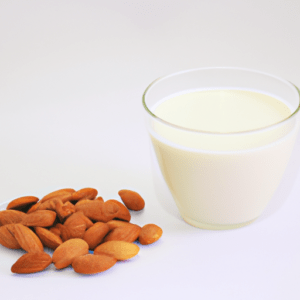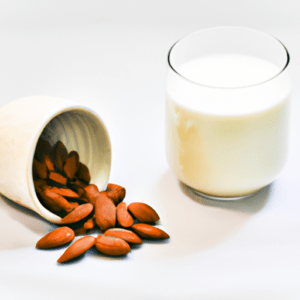The Creamy Superfood: Exploring the Health Benefits of Almond Milk
Almond milk has lately gained appeal as a healthy and dairy-free alternative. Aside from being a creamy plant-based milk, almond milk has other health advantages that make it an excellent supplement to any diet. Almond milk is a great option for individuals who are lactose intolerant or looking for a calcium-rich beverage because it is high in minerals and has few calories. In this post, we will look at the nutritional content of almond milk and how it may benefit your health. We will also give some delectable dishes that include this flexible and healthful milk substitute. So, whether you want to live a better lifestyle or explore the world of plant-based milk, almond milk is a great option to consider.
Indulge in the Creamy Power of Almond Milk: Unveiling the Health Benefits and Nutritional Value of this Dairy Alternative
The Rise of Almond Milk as a Dairy Alternative
 As people seek alternatives to typical dairy products, almond milk has been increasingly popular over the past decade. Many people choose almond milk for various reasons, such as lactose intolerance, dietary choices, or health concerns. Almond milk is a creamy, tasty choice that is simple to add to everyday activities.
As people seek alternatives to typical dairy products, almond milk has been increasingly popular over the past decade. Many people choose almond milk for various reasons, such as lactose intolerance, dietary choices, or health concerns. Almond milk is a creamy, tasty choice that is simple to add to everyday activities.
Almond milk is plant-based and has no lactose or cholesterol, unlike cow’s milk. It is also naturally low in calories and saturated fats, making it an appealing choice for individuals wanting to maintain a healthy diet. The increased use of almond milk has cleared the way for many new almond milk products, such as flavored variations or mixes with other plant-based components.
Furthermore, almond milk manufacturing has a smaller environmental effect than dairy milk. Almonds require fewer water and land resources than typical dairy farming, making almond milk a more sustainable option for environmentally concerned consumers.
With its rising popularity and countless advantages, it’s no surprise that almond milk has become a popular alternative to dairy milk.
The Nutritional Value of Almond Milk
Almond milk is not only tasty, but it is also quite healthy. It is high in critical vitamins and minerals, which can help with general health. One cup of almond milk generally includes roughly 30% of the daily calcium requirement, which is essential for strong bones and teeth.
Furthermore, almond milk contains vitamin D, which assists in calcium absorption. This combination makes almond milk an ideal choice for anyone looking for calcium-rich alternatives, particularly those who are lactose intolerant or allergic to dairy.
Aside from calcium, almond milk is high in vitamin E, which is an antioxidant and protects cells from oxidative stress. It also includes vitamin A, which helps with eyesight, immunity, and skin health.
Although almond milk has less protein than cow’s milk, it may still be included in a well-balanced diet. Individuals who use almond milk can supplement their protein intake with almonds, lentils, or lean meats.
Almond Milk and its Health Benefits
Because of its nutritious content, almond milk consumption has been linked to a number of health advantages. Almond milk can assist in promoting heart health, regulating weight, and enhancing digestion if consumed on a regular basis.
Almonds are high in monounsaturated fats, which have been linked to a lower risk of heart disease. Almond milk, which is made from almonds, contains some of the same heart-healthy characteristics. According to research, integrating almond milk into a healthy diet can help maintain good cholesterol levels and lower the risk of cardiovascular disease.
Furthermore, because of its low calorie and fat content, almond milk is an ideal choice for individuals looking to lose weight. It is a delicious and healthful alternative to higher-calorie beverages that does not sacrifice taste.
Almonds and almond milk include fiber, which assists digestion and supports gut health. For some people, drinking almond milk on a regular basis may help relieve digestive disorders including bloating, constipation, or indigestion.
Almond Milk: A Calcium-Rich Option
Lactose-intolerant people frequently struggle to achieve their daily calcium requirements. Almond milk is a calcium-rich alternative that can help fill this nutritional void. Almond milk is often supplemented with calcium and vitamin D, as previously noted, ensuring optimal consumption of these necessary minerals.
Incorporating almond milk into one’s diet can help maintain strong bones and teeth while also lowering the chance of developing osteoporosis or other bone-related diseases. It is an excellent substitute for individuals who cannot handle dairy or want plant-based milk alternatives. It is crucial to highlight, however, that consumers should contact a healthcare practitioner to verify that their nutritional needs are met.
Almond Milk for Individuals with Lactose Intolerance
Lactose intolerance affects many of the population, making it difficult to consume dairy products without pain. Almond milk is a great lactose-free option that is simpler to digest and less prone to cause stomach troubles.
Individuals with lactose sensitivity who choose almond milk can still enjoy a range of foods and beverages without jeopardizing their digestive health. There are several ways to include this dairy replacement into everyday routines, such as adding almond milk to coffee, cereal, or smoothies.
Furthermore, almond milk has a creamy texture and mild flavor that is similar to typical dairy milk, making it an enticing alternative for individuals who are avoiding dairy products.
Exploring Recipes with Almond Milk
The adaptability of almond milk extends beyond its use as a single beverage. It may be used in place of regular milk in various recipes, making it a wonderful component for both sweet and savory foods.
Almond milk provides moisture and a slightly nutty flavor to cakes, muffins, and cookies when baked. It may also be used to make homemade ice cream or puddings for a decadent and dairy-free treat.
Almond milk may be used as a basis for creamy sauces or soups in savory recipes, creating a velvety texture and complementing the flavor. It may also be used as pancake batter or smoothies for a healthful and tasty variation.
Exploring recipes using almond milk offers up a world of culinary delights and allows people to enjoy their favorite foods without compromising their dietary choices or health objectives.
Almond Milk: A Versatile Plant-Based Milk
 Because of its adaptability, almond milk stands out among plant-based milk alternatives. Because of its neutral flavor character, it may be easily incorporated into a wide range of meals and beverages without dominating other components.
Because of its adaptability, almond milk stands out among plant-based milk alternatives. Because of its neutral flavor character, it may be easily incorporated into a wide range of meals and beverages without dominating other components.
Almond milk adds a creamy and pleasant touch to any meal, whether it’s used in a morning coffee, a bowl of cereal, or a homemade vegan cheese sauce. Individuals following various nutritional approaches, such as vegan, vegetarian, or flexitarian lifestyles, might enjoy it.
Furthermore, almond milk is a shelf-stable product that may be kept without refrigeration until it is opened. This ease of use makes it an excellent solution for individuals who are on the road or have limited refrigerated space. It is lightweight and portable, making it ideal for picnics, excursions, and lengthy travels.
What are the health benefits of almond milk?
Almond milk has various health advantages that make it a popular choice among people looking for a dairy substitute. For starters, it is low in calories and cholesterol, making it an excellent choice for people seeking to lose weight and lower their cholesterol consumption. Furthermore, almond milk contains minerals such as vitamin E, an antioxidant that helps protect the body from cell damage. It also includes calcium, magnesium, and potassium, all of which help to maintain strong bones, muscles, and nerves.
Why is almond milk considered a nutritious dairy alternative?
Because of its outstanding nutritional profile, almond milk is recognized as a nutritious dairy replacement. It’s high in protein, healthy fats, and vitamins and minerals. Furthermore, almond milk is usually enriched with elements like vitamin D and calcium, which are important for bone health. Compared to cow’s milk, almond milk has fewer calories and no cholesterol or lactose. Its high vitamin E concentration also has antioxidant qualities that improve general health.
Can almond milk be beneficial for individuals with lactose intolerance?
Absolutely! Almond milk is a great alternative for people who are lactose intolerant because it is lactose-free. Lactose intolerance is characterized by the inability to digest lactose, a sugar present in milk and dairy products. Those with lactose sensitivity can still enjoy a creamy and healthy beverage without suffering the unpleasant symptoms associated with lactose consumption by substituting almond milk.
Is almond milk a good source of calcium?
While almond milk is not naturally high in calcium like dairy milk, several manufacturers add calcium to their almond milk products. Calcium is necessary for the maintenance of strong bones and teeth, as well as for muscular function and nerve transmission. When shopping for almond milk, it is best to choose for fortified varieties that have a calcium concentration comparable to that of typical dairy milk.
Are there any potential drawbacks or considerations when consuming almond milk?
Although almond milk has many health advantages, there are a few things to keep in mind. For starters, because almond milk is made from almonds, it may not be acceptable for people who are allergic to nuts. Furthermore, some commercially manufactured almond milk may contain additives such as sweeteners or thickeners, which may be an issue for people who are limiting their sugar consumption or want a more natural product. Finally, while almond milk is a nutritious complement to one’s diet, it should not be utilized as a single source of nourishment, particularly for newborns or those with unique dietary needs.
Can almond milk be used in various recipes?
Absolutely! Almond milk is versatile and may be used in a variety of recipes in place of typical cow’s milk. Smoothies, oatmeal, pancakes, baked products, and even savory foods like soups and sauces can benefit from it. Its creamy texture and mildly nutty flavor make it a perfect addition to various culinary masterpieces, providing richness and depth. The possibilities for adding almond milk to your favorite dishes are boundless.
What are some calcium-rich recipes that can be made with almond milk?
Almond milk may be used in various calcium-rich dishes to help you achieve your daily calcium requirements. Make a calcium-rich green smoothie using almond milk and leafy greens such as kale or spinach. Another possibility is to make muesli with almond milk.
Embracing the Benefits of Almond Milk
 As shown throughout this article, almond milk has several health advantages and may be used as a dairy substitute. Its high nutritional value, adaptability, and creamy texture make it an excellent supplement to any diet.
As shown throughout this article, almond milk has several health advantages and may be used as a dairy substitute. Its high nutritional value, adaptability, and creamy texture make it an excellent supplement to any diet.
Whether you are lactose intolerant, looking for a calcium-rich alternative, or simply exploring the world of plant-based milk, almond milk is a great option. Its expanding popularity reflects increased knowledge of its advantages and an increasing number of people moving away from traditional dairy products.
So, enjoy the creamy goodness of almond milk while reaping all of its health advantages and nutritional worth. Allow almond milk to be your gateway to a better and more sustainable lifestyle, from sipping a warm cup of almond milk latte to experimenting with tantalizing dishes.
Harnessing the Health Benefits of Almond Milk: 3 Delicious Recipes to Try
-
Almond Milk Smoothie:
- Ingredients:
- 1 cup of unsweetened almond milk
- 1/2 cup of frozen mixed berries
- 1 ripe banana
- 1 tablespoon of almond butter
- 1 tablespoon of honey (optional)
- 1/2 teaspoon of vanilla extract
- Ice cubes (optional)
- Instructions:
- Add the almond milk, mixed berries, banana, almond butter, honey (if using), and vanilla extract to a blender.
- If you prefer a thicker smoothie, you can add a few ice cubes as well.
- Blend until smooth and creamy.
- Pour into a glass and enjoy your nutritious almond milk smoothie.
- Ingredients:
-
Almond Milk Oatmeal:
- Ingredients:
- 1 cup of rolled oats
- 2 cups of unsweetened almond milk
- 1/2 teaspoon of cinnamon
- 1/4 cup of chopped almonds
- 1 tablespoon of honey or maple syrup (optional)
- Fresh berries or sliced banana for topping
- Instructions:
- In a saucepan, combine the almond milk, rolled oats, and cinnamon.
- Cook over medium heat, stirring occasionally, until the oats are creamy and have absorbed the almond milk (usually 5-7 minutes).
- If desired, sweeten with honey or maple syrup.
- Serve in bowls and top with chopped almonds and fresh fruit.
- Ingredients:
-
Almond Milk Chia Pudding:
- Ingredients:
- 1/4 cup of chia seeds
- 1 cup of unsweetened almond milk
- 1/2 teaspoon of vanilla extract
- 1 tablespoon of maple syrup or agave nectar (adjust to taste)
- Fresh berries or sliced fruit for topping
- Instructions:
- In a bowl, combine the chia seeds, almond milk, vanilla extract, and sweetener.
- Stir well to ensure the chia seeds are evenly distributed.
- Cover the bowl and refrigerate for at least 2 hours or overnight, allowing the chia seeds to absorb the liquid and create a pudding-like consistency.
- Before serving, give it a good stir and top with fresh fruit.
- Ingredients:
The post Almond Milk Health Benefits – The Creamy Superfood appeared first on https://gqcentral.co.uk


Comments are closed